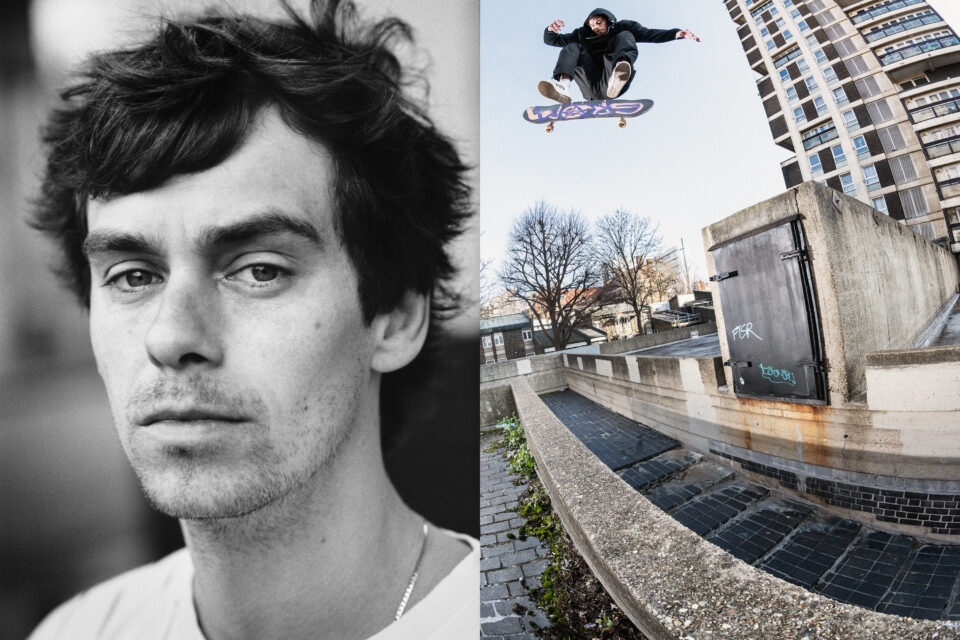Previous post
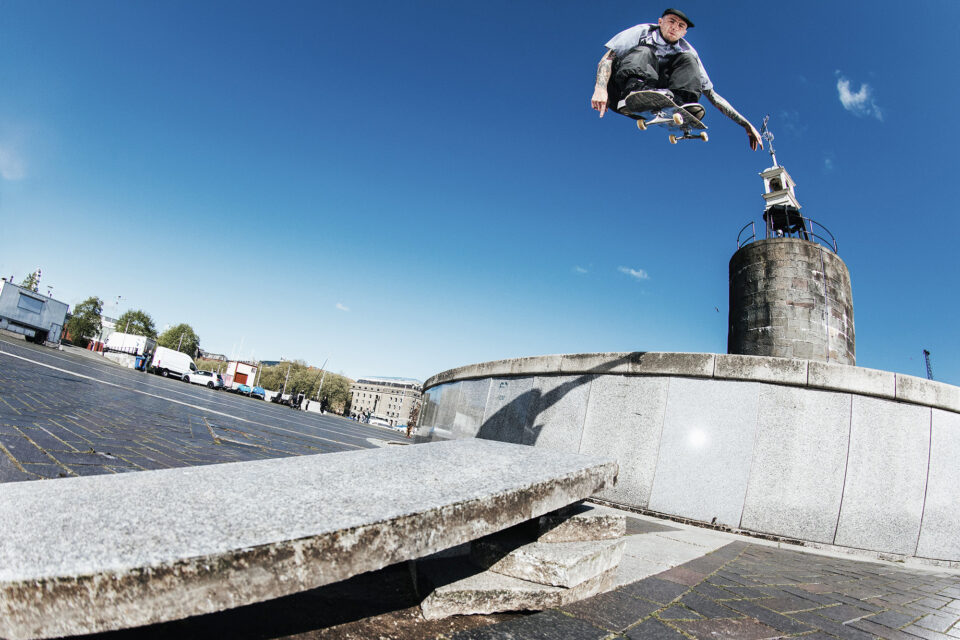
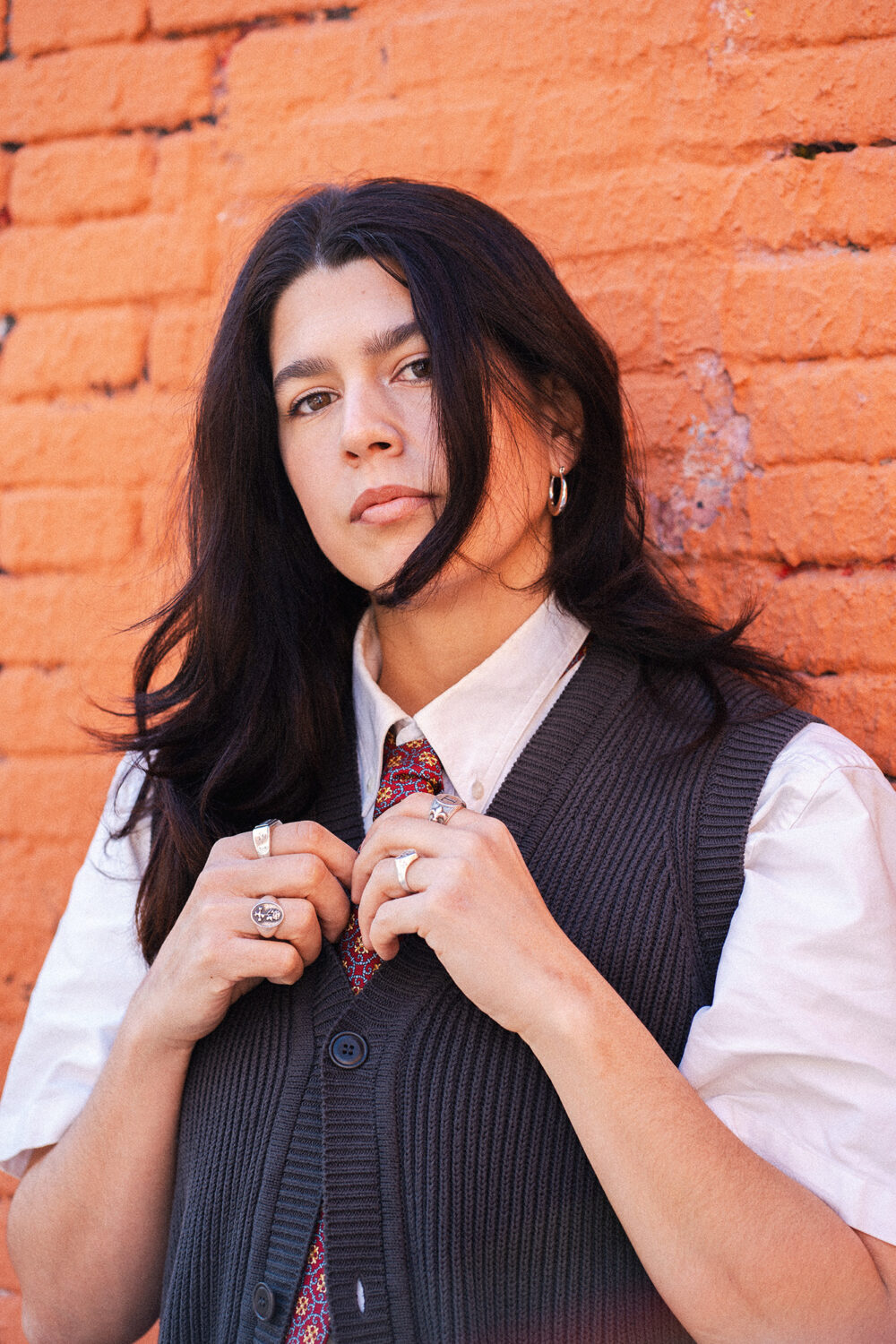
Portrait: Mochón
Interview: Kingsford
In your last Grey interview, which we did two-and-a-half years ago, you spoke about your decision to move away from the Olympics and the contest circuit to focus more on street skating. How is that going?
After moving away from the contest circuit, I really liked having the freedom to film and skate whatever I wanted. I didn’t have a super-strict training programme for the Olympics, but I went from having a schedule to not having anything, and that was kind of hard… not hard, because I loved it, but suddenly I had a lot of free time and that was tricky for my mental health. So I did a lot of things to have some kind of schedule, like going to the gym a lot and also being quite organised about which days I went skating.
Last time we spoke, you were just about to start a masters in graphic design and digital marketing. I guess that helped with structure too.
Of course it depends on the person, but I need a routine. So I did school, then high school, then university, then during and after university I was doing the Olympics and right after that, I jumped on to my masters. After all that, it was weird to have that much free time and not have a clear goal in life, so I decided to get a job. Even though I could live off skateboarding and content creation, I didn’t have any stability or a clear routine that made me focus.
Tell us about your new job.
I got a job as a marketing manager in a UX / UI design boutique. It’s basically a tech company. They work a lot with AI, which is super interesting and kind of has something to do with my engineering degree, but also not at all. I just started this month, so it’s very fresh, but I’m definitely liking it. This is the first time I’ve worked for a company with a schedule, which is insane because I’m 30 years old. I’ve escaped the work life game enough already (laughs). Of course I’ve always loved the skateboarding life, and I’m super grateful for all the opportunities I’ve had, but I’ve studied so much and lived so many other things. I just feel like I need something else – for my sanity, but also to appreciate skateboarding more.
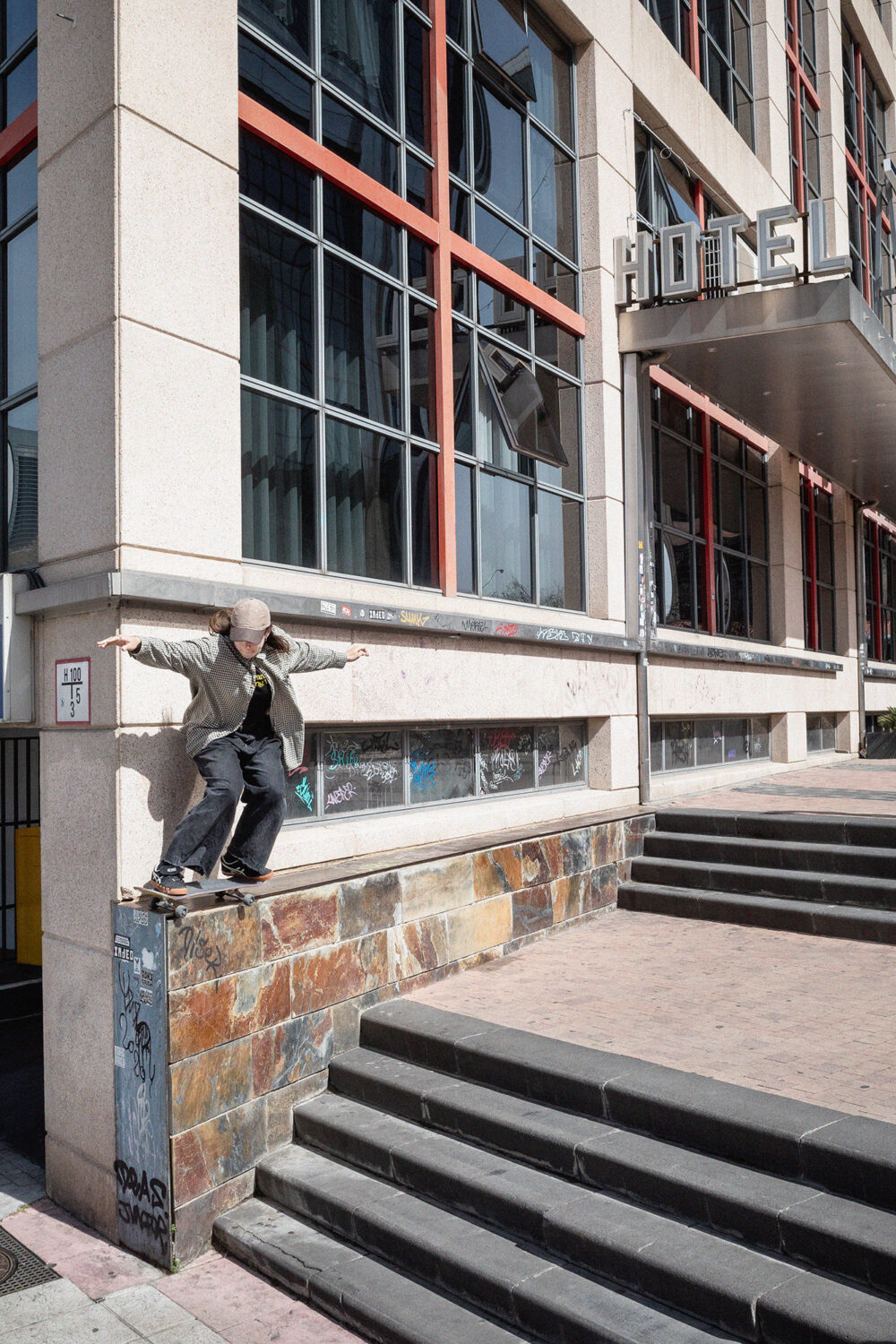
Since that last interview, you left Enjoi and joined Louie Barletta’s new company, Jacuzzi Unlimited. Talk us through all this.
I was really hyped on Enjoi because they invited me to join them on the High Wire Tour in the States. This was right after the Olympics. It was my first American tour and my first tour with a big skate company. Because it clashed with a Federation (Real Federación Española de Patinaje) training programme, it was one of the things – along with injuries – that made me choose between continuing with the Olympics and focusing on street skating. Being invited on that tour really helped me to make a decision, so I went on tour with them.
How was that experience?
It was really great. I joined them for part of the tour from Pittsburgh, through Pennsylvania to Philadelphia. It was a crazy experience – these guys drink a lot – but it was a lot of fun and I was really hyped. We also did some demos at local skateparks, which I really enjoyed. I felt that the tour was going to give me a great push in skateboarding, then, out of the blue, Louie told us that he was leaving Enjoi. I was devastated. He said: “I understand if you want to take a different path.” I considered focusing on something smaller and European, but then I thought: “I really like the (Jacuzzi) team, I already know them, I trust Louie and everything he does is super cool, so of course I’m going to go with them.” At first, we didn’t have boards, so we were painting boards from other brands, doing our own designs and getting creative. That was a very cool era.
Have you travelled with the Jacuzzi team yet?
Yeah. I went on the first trip back in 2023, to Copenhagen for the Open. That was actually the first time we had Jacuzzi boards and they weren’t in stores yet. The boards were reflective and the logo was neon, so they were easy to recognise. We were skating around the city and people would ask: “Is that Louie’s new brand? That’s so cool. Where can we get that?” We felt like rock stars (laughs). I really like the team and they’re all my friends. We all get along and that’s the main thing.
Another recent sponsor switch-up was the move from adidas to Asics.
That was another big change and it was very recent. I am super grateful for all the opportunities adidas gave me these past years, but I just felt like I needed to do something different. With Asics, everything is very fresh and I feel like I have a bigger opportunity to create things my way.
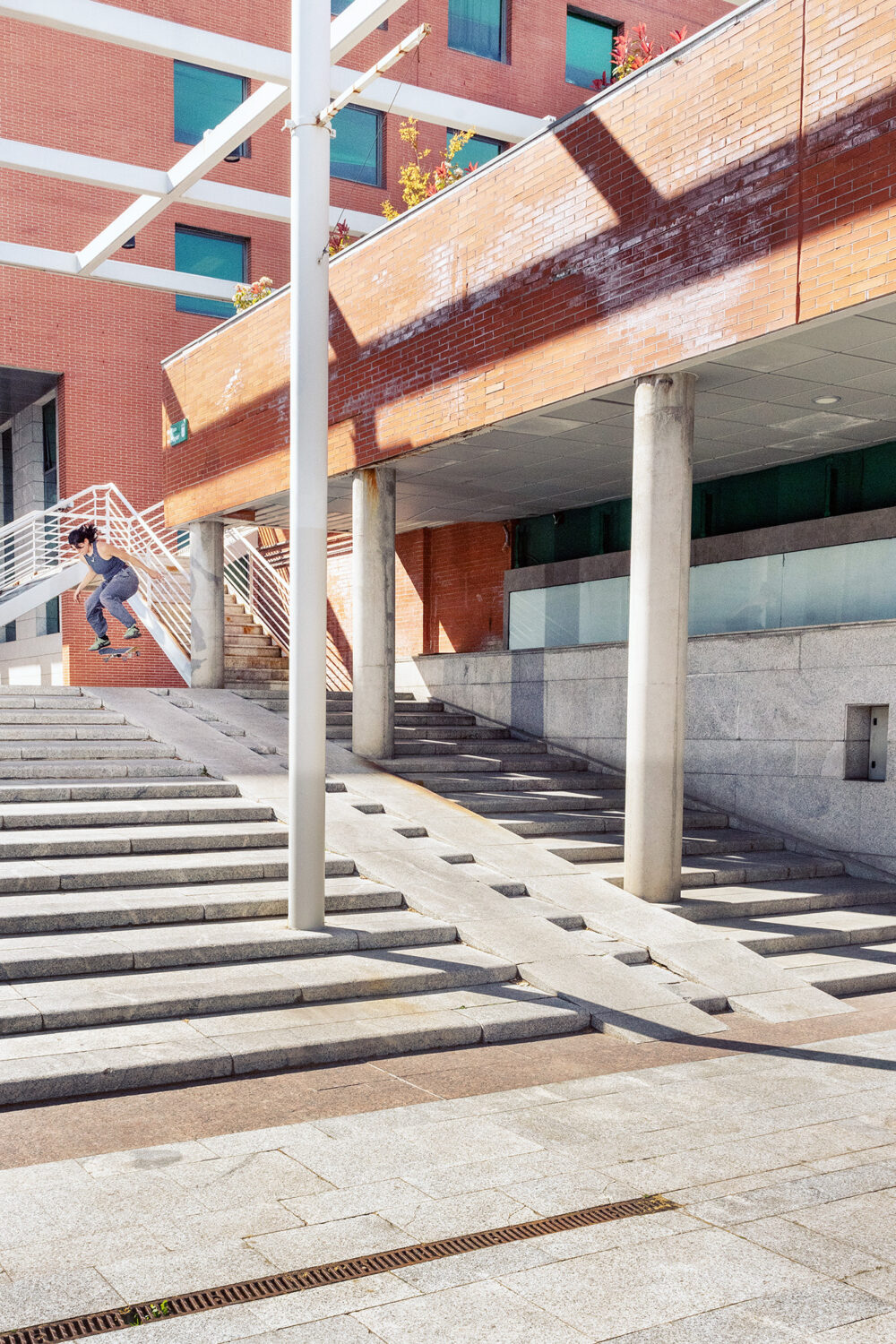
Can you work on video projects for your sponsors in Madrid, or do you need to travel to be involved?
It’s definitely not as easy to film in Madrid as it is in other cities. There are basically two filmers, and just one with the right set-up, so I travel a lot to film. It would probably be much easier if I lived in Barcelona, but skateboarding isn’t everything. There’s a train that takes me there in two hours and it’s very cheap, so I go often. Asics helps with travel budget too, which makes things easier. For this next video project I’m working on, I have a lot of clips from Madrid, but also a lot from LA, Barcelona, Paris, Utrecht and all over the world. I just get way more inspired when I’m travelling.
That makes sense.
Also, nowadays, you can be anywhere in the world if you have a social media presence. I don’t think it’s necessary to live in LA to make it in skateboarding any more. I’d go as far to say that brands like that you’re in a different place because you bring a different perspective.
You mentioned content creation as a source of income earlier. I noticed that recently, you have been making content for Instagram in areas outside skateboarding like fashion, art and interior design. Was there a financial motivation behind this shift?
The switch wasn’t because of financial reasons. Skateboarding is a big part of my life, but I also like many other things and I wanted to start including them in my content and experimenting. For a long time, I posted mostly skate tricks, often at the skatepark. I was scared to post non-skateboarding content because I thought people would stop liking me and unfollow me. That pressure you have when you’re trying to make it in skateboarding really sucks, especially as a woman. You have to prove so much all the time – that you can actually skate, that you deserve your sponsors – and you get so many hateful comments. I’m talking about me, but I feel like many other women and non-traditional skateboarders can relate to this. Every time you post anything that’s not a great trick, you get a lot of hate and stupid comments. I don’t have to post the hardest trick I can do all the time. Sometimes I do a fucking wallie and I want to post it because I love it, and that’s OK.
I find it inspiring when I see skaters doing different things and posting about their art or a cute photo they took when they went hiking – I think it shows a human side of skaters. So I decided to give it a go and some brand partnerships came up, which were really cool because I could experiment with them. Also, it was a different income. I always try to work with brands I relate to or like. I was offered crazy things, like a partnership with a Spanish pizza brand. They wanted me to make a very stupid video and I couldn’t do it. It was very well paid and I would have been happy with that money to pay rent that month, but I said no. I feel like not all money is good money, so you have to choose carefully.
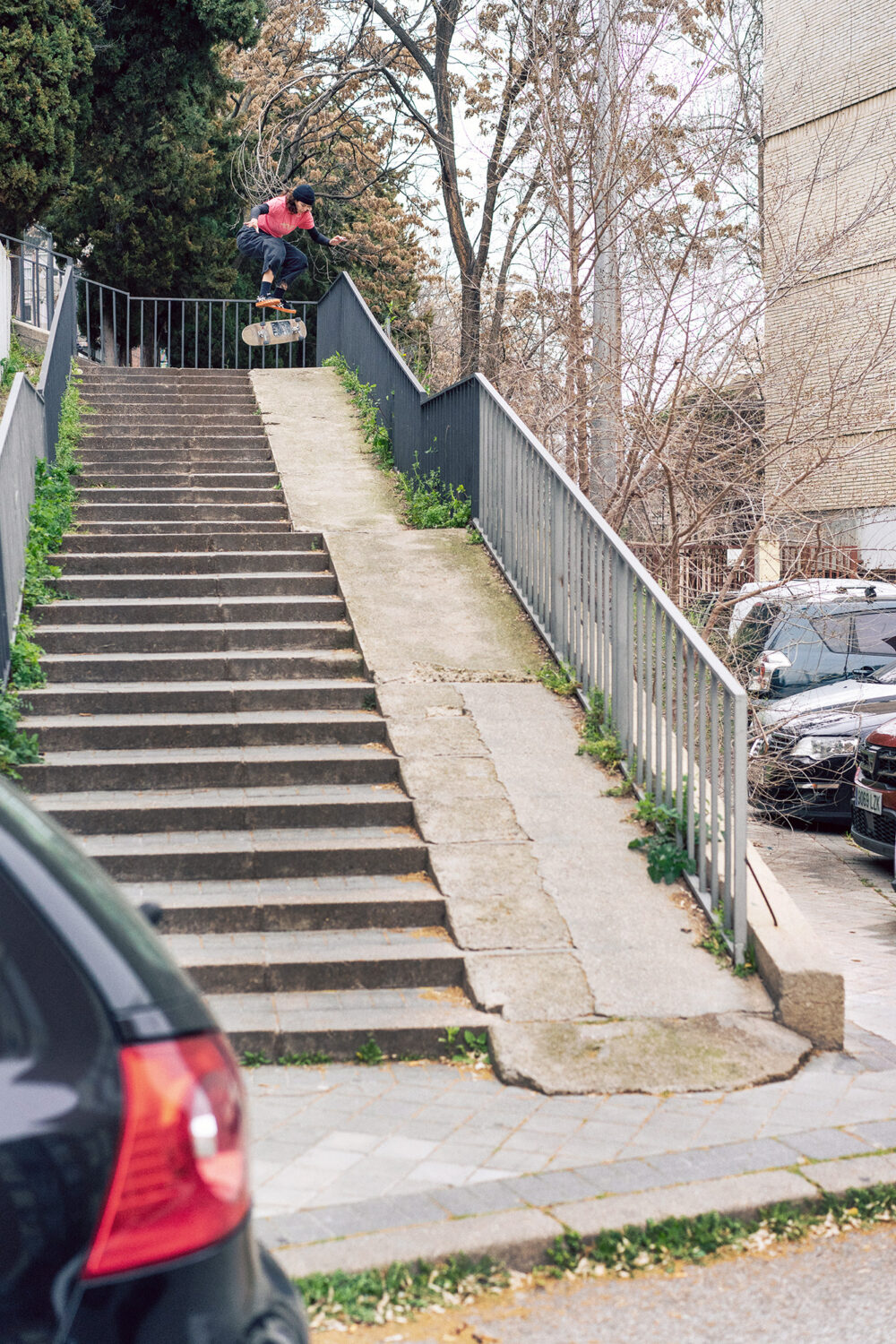
What’s your process for coping with hateful comments?
I used to delete them. I was affected by them and I was trying to understand why that person wrote that to me, but then I tried to focus more on understanding why those comments affected me and made me so sad. Once I started working towards that, I began to care less. I don’t really delete hate comments any more. Sometimes I even interact with them in a funny way. For example, this guy commented: “You skate so slow,” and I replied: “Well, fast is not always great, Joseph,” and my comment got so many likes. I realised that these trolls might just be kids who have access to the internet, create fake Instagram accounts and drop hate comments to 30-year-old skate women in their free time. I think that’s the best way to take it, but social media should definitely be a safer place for everyone.
While we were chatting about this interview, you mentioned one particular photo from Pride that received a lot of hateful comments.
Yeah, that was a big thing. I got invited to the Pride parade in Madrid. It was my first time and I was very happy. We (Andrea and her girlfriend, Belén) took a photo kissing. It wasn’t a crazy sex photo or anything, it was like the kiss you give your grandmother, so I didn’t even think about it. I posted that photo with some others of my outfit, which I really liked, and the post got so many hate comments, like emoji faces throwing up or: “OK, time to unfollow you.” Also, 300-400 people unfollowed me in an hour, which was really weird. It was hard at the time, but when I think about it now, it’s way better that these people don’t follow me. because why would I want homophobic people seeing my posts?
That number of people unfollowing over a kiss is pretty shocking.
Yeah, it was very weird. You can like it or not, but why would you be so pissed to see two women kissing? It’s not even about not posting skate content, it’s about homophobia. Skateboarding is a very open-minded sport / lifestyle, but there’s still a lot of homophobia in it. Also, I have a lot of trans skater friends and they have experienced things like this quite often. So there’s still a lot of work to do in the skate community. I think that the skate industry should realise how big its role is.
You mean in terms of representation?
Yeah, in terms of representation or just anything that would help queer and non-traditional skateboarding communities. It’s been a cis male-dominated sport for a long time, but things have to change.
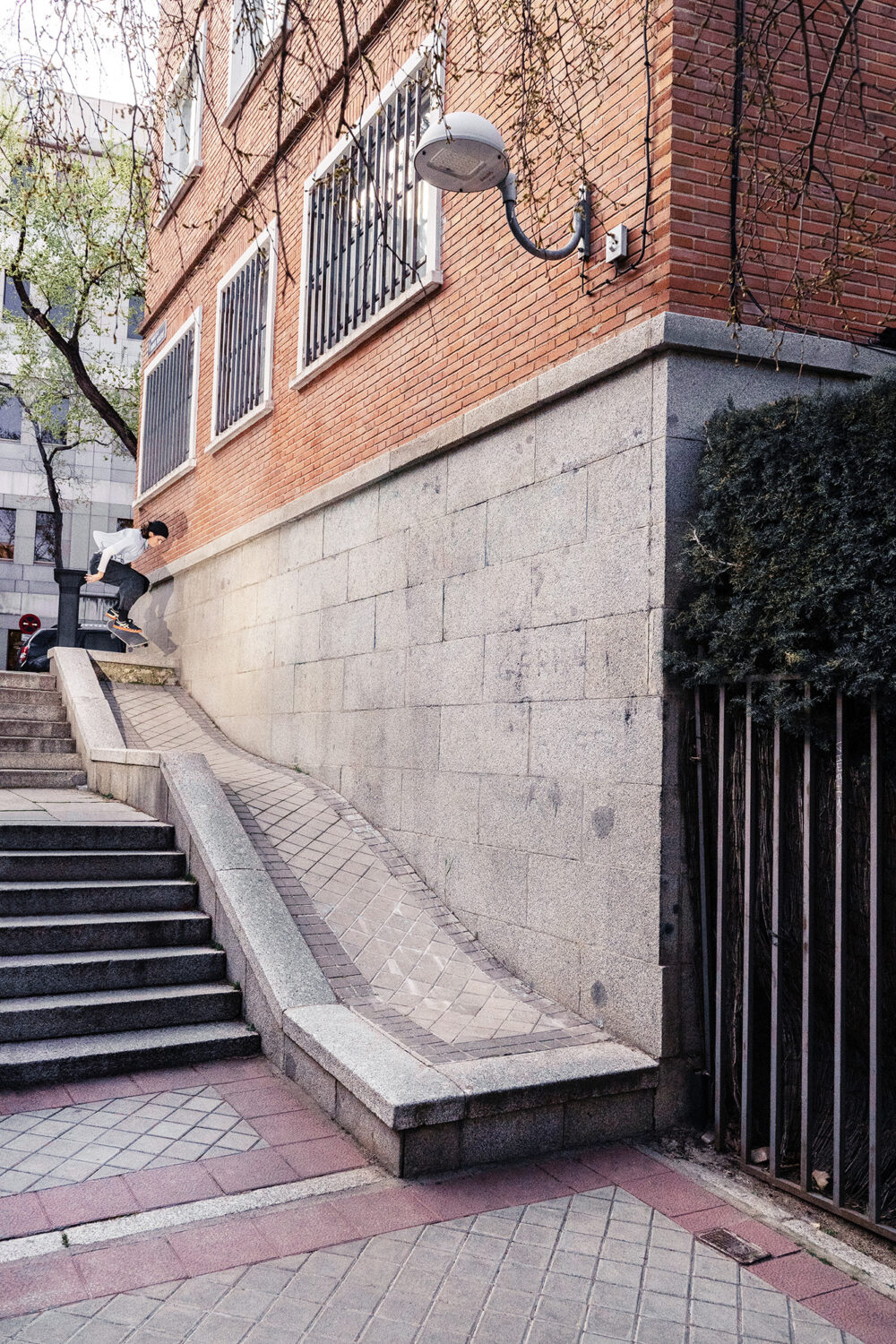
Another topic you wanted to talk about was the menstrual cycle and skateboarding.
Yeah. I started to get more into it when I began working out more and taking care of my health for the Olympics. I had access to people who knew a lot about health and sports performance, and I learned a lot, but not everyone has access to that. I started feeling a big change in my body when I turned 25, which is insane because I had my period for a long time before. In this new generation of women skate-boarders, most are little girls and many won’t have their periods yet. I think there should be more information out there for them because they’re going to feel a big change when their period comes and the menstrual cycle starts. I’m no expert – all this comes from my research and experience – but I’ll do my best to explain it to you.
Thank you.
So basically, there are four stages in the menstrual cycle: the menstrual phase, the follicular phase, ovulation and the luteal phase. It’s not only when you actually bleed, there are a lot of days involved in the cycle, which is typically around 28 days in total, but can vary, depending on the person. I’m going to explain a little about each stage.
The menstrual phase is when you actually bleed and you experience very low energy, cramps and muscle fatigue. It’s actually proven that you have less motivation and more soreness after practicing sport, like skating. Movement and light exercise can actually help, though. During this phase, your hormone levels are lower, specifically oestrogen.
After this really bad phase, there is a really great one: the follicular phase. That’s when oestrogen rises and this is your power phase. Energy levels go up, muscle recovery improves and you have a better ability to focus and concentrate because you have this mental clarity. This is a great time to practice new tricks, push yourself and go for longer sessions. When I have to film or when I want to schedule a skate trip, I always check my menstrual calendar and I know exactly when I’m going to feel my best. Skaters who have a menstrual cycle really struggle with skating, filming, practising sports and life in general, because there are a lot of days when you’re not going to feel good. It really plays out in skateboarding and filming – it makes things way harder.
Right after the follicular phase, there is ovulation. This is a phase where you feel good because your oestrogen is really high. That can give you maximum strength and endurance, however, with this peak of oestrogen, there can be increased ligament laxity. Research has shown that there is more risk of suffering an ACL injury during this phase because of that.
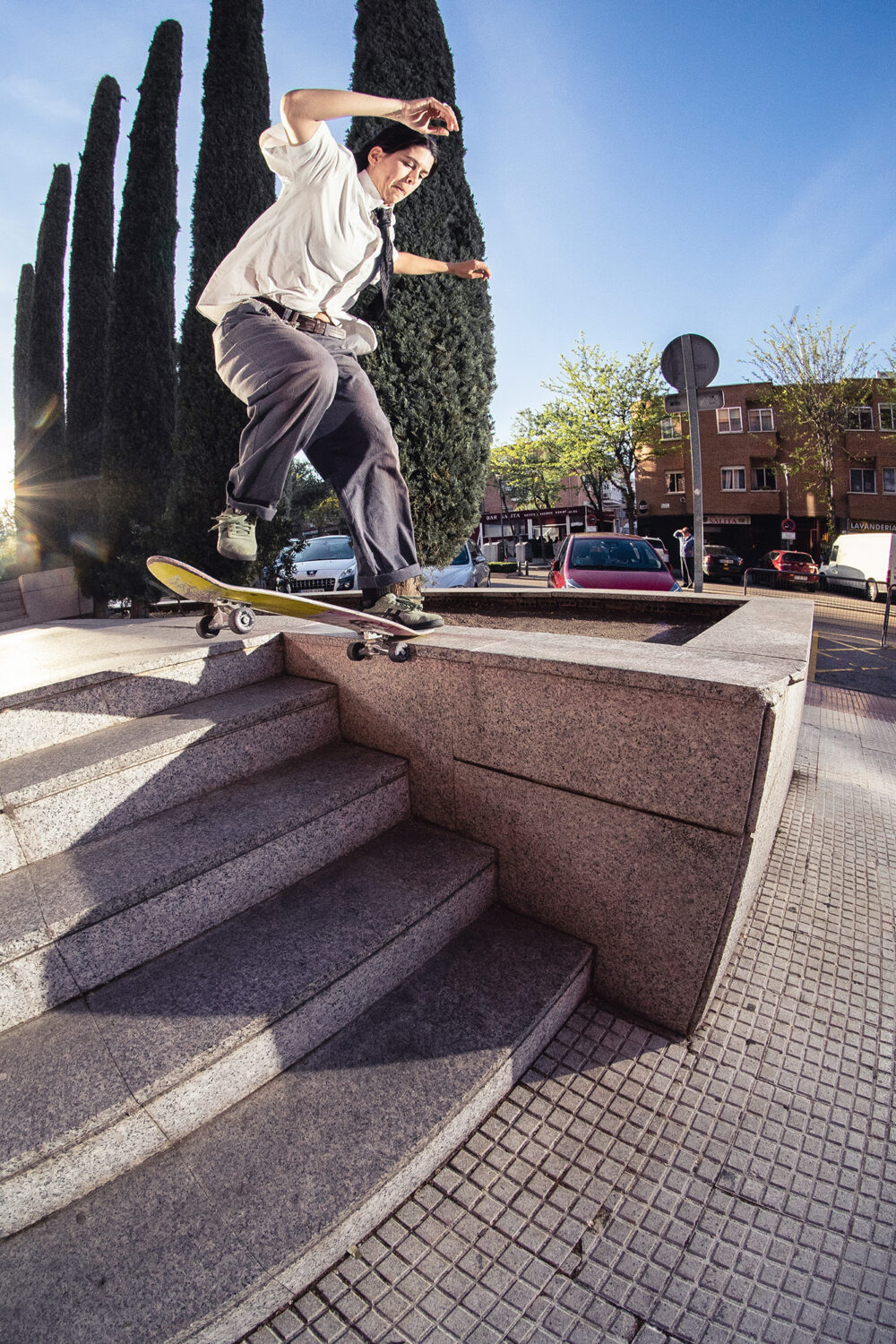
That’s really interesting.
So warming up properly in this phase is key. You have to be really careful with nutrition too. I injured my knee not so long ago and I didn’t understand what happened because I didn’t fall or anything. Then I checked my calendar and realised it was during ovulation. I was like: “OK, this makes sense.” I should have taken it easy, or at least avoided impact skating during that phase.
After ovulation, we go to the luteal phase, which is right before the menstrual phase. This is where the other hormone, progesterone, rises, and this can lead to more fatigue, bloating and lower coordination. Your body may hold on to more water and you can feel heavier because of this, so reaction times may be slower. This is why some skaters feel more frustration or irritability, which can affect focus. I always skate really badly right before my period. I cannot land 360 flips – it’s like I’ve never done that trick in my life. It’s very frustrating, but I try to be kind to myself because now I know what’s going on with my body. This is why I recommend to anyone who has a menstrual cycle to track it and understand what your body needs depending on the week. If anyone gets interested after reading this, let me know and I’ll happily explain in more detail.
Thanks for that. It was really interesting to learn about how each phase can affect skateboarding. Last time we spoke, you were just getting settled in Madrid and you seem quite happy there now. Do you see yourself staying long term?
We’ll see if some other plans come up suddenly, but Madrid just makes sense for me right now. It gives me a balance of different things in life, not only skateboarding.
What are your plans for the rest of the year?
I’m working on two different (video) projects, one with Jacuzzi and one with Asics. They’re both coming out this year, hopefully after the summer, right after this interview.
If you’re interested in learning more about skateboarding and the menstrual cycle, get in touch with Andrea via Instagram. Alternatively, Girl Skate UK has some excellent resources on its website.

